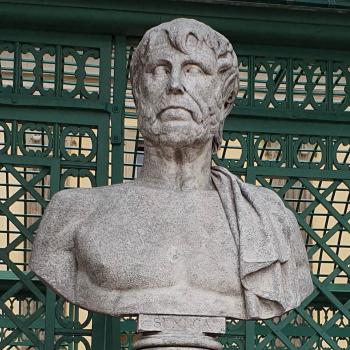
Stoicism is an ancient Greek philosophy that dates all the way back to 300 B.C. Yet despite the fact its best known voices, Seneca the Younger and Marcus Aurelius, lived and taught around the time of Jesus Christ, it still holds great sway today. Both old and new books on stoicism, by authors like Ryan Holiday, regularly top Amazon’s best-selling philosophy book list.
The stoic philosophy is based on a system of ethics that include having a set of high moral standards and treating everyone fairly and justly, regardless of their class or social standing. But I think the key tenet to stoicism is found in this lightly edited passage from Wikipedia:
The path to happiness involves accepting the moment as it presents itself. Do not allow yourself to be controlled by the desire for pleasure or by the fear of pain.
To be a stoic is to know how to manage your feelings, both positive and negative, and take life in stride. The stoic is not easily rattled and remains calm under pressure, seemingly oblivious to external circumstances. The stoic doesn’t get angry or envious or lose her composure. (Think Chief of Police Marge Gunderson in Fargo as she investigates a homicide or the unjustly jailed banker Andy Dufresne in Shawshank Redemption.)
How do the stoics do it? Well, they have a way of looking at the world from a different perspective, using a few coping mechanisms to help them along the way. I discovered several of these strategies in a podcast series called The Stoic Path on the Waking Up meditation app. It’s hosted by William B. Irvine, a professor of philosophy and author of several books on stoic philosophy.
While Irvine offers a total of 14 separate lessons on stoicism, I found the following three to be most helpful. Amazingly, this philosophy, which predates Christianity, has valuable lessons to teach us today. Following the lead of the stoics can both help us keep our cool when life heats up and also help us regain an appreciation for the everyday world around us.
3 Valuable Lessons from the Stoic Playbook
-
Change the way you frame events.
The idea here is that events in life don’t cause problems, it’s how you react to them that causes problems. You may find that over the course of a day, you allow yourself to get upset over trivial issues or by things that you have absolutely no control over. To prevent this, you need to find a way to reframe events thereby reducing the number of negative emotions you may feel.
Irvine tells us that you can look at life one of two ways. You can view negative events in your life through the self-absorbed “unfairness frame” by which you see any ill that comes your way as being unfair to you. For instance, you might think the barista at your coffee shop is moving a little too slow because they have no concern for your time. Or you view the person who cut you off in traffic as a malicious jerk.
An alternate approach is to view life through the “other factors” frame. To do this, you’ve got to realize that the people you encounter each day may be having a tough go of it. The worker at the coffee shop may have just heard her mother is ailing and be pre-occupied. The person who cut you off in traffic may be freaked out because they’re late for an important job interview.
You might look at this thought process as “it’s not you, it’s them.” When you reframe life with the perspective that no one is out to “get you” or hurt you, you can remove anger and angst from your life or at least reduce it. Just remember that no one can do harm to you—unless you let them.
-
Approach life with a fresh set of eyes.
What if you could look at life as a child again? Imagine seeing a flowing fountain in a plaza, the sun setting on the horizon, or your cat playing with a toy mouse, for the first time in your life. You’d be awe-struck and amazed that such things even existed.
The fact is, due to a perceived familiarity and a “seen this, done that” attitude, we often stop paying attention to the world around us. Items that once grabbed our attention, now seem mundane. You don’t quite look at them, you look past them or through them.
Irvine suggest that we try a “fresh eyes project.” With this exercise, we look at our surroundings as if we are seeing them for the first time. You can start with the place you live. Pretend for a moment you were never in your home before and move from room to room looking at the details, the crown molding around the door frames, the curios on the bookshelf.
I tried this exercise and upon walking into a spare bathroom I was surprised to find a beautiful painting by Monet, The Beach at Sainte-Adresse, hanging on a corner wall. I suppose I knew it was there but I hadn’t really seen it for years, it had become like wallpaper. It was one of many interesting items in my home I found I was overlooking.
3. Pretend the good things in your life were suddenly gone.
There are many things in life we take for granted. Irvine asks us to try a stoic exercise that asks the question: What if they were removed? What if the cup coffee in your hand was taken away? What if you suddenly lost your ability to hear? What if the car in your driveway was suddenly gone because you didn’t have the money to make the payments?
There are so many things in our lives that we take for granted, both modern conveniences and small pleasures, that people in other parts of the world, and this country, simply can’t afford or don’t have access to. Look around you right now. You can probably spot several things you couldn’t imagine being without, from the small computer you hold in your hands to your own health and well-being.
The fact is our lives are pretty good—if only we took the time to realize it.













